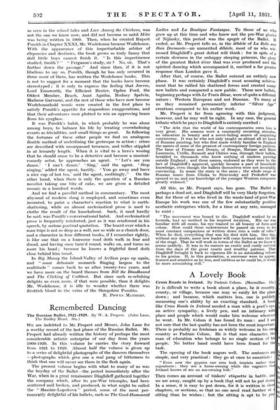Remembered Dancing
WE are indebted to Mr. Propert and Messrs. John Lane for a worthy record of the last phase of the Russian Ballet. Mr. Propert had already written the history of perhaps the most considerable artistic enterprise of our day from the years 1909-1920. In - this :volume he carries. the story forward from 1921 to 1929. Almost half the volume is given up to a series of delightful photographs of the dancers themselves —photographs which give one a real pang of bitterness to think that one will never see them in the flesh again.
The present volume begins with what to many of us was the heyday of the Ballet—the. period immediately after the War, when in a great renaissance Diaghileff gathered together the company which, after its pre-War triumphs, had been scattered and broken, and produced, in what might be called the " Madsine-Lopokova " period, some of the most per- ' manently delightful of his ballets, such as The Good-Htnnoured Ladies and La Boutique Fantasque. To those of us who grew up at this time and who knew not the pre-War glories of Nijinsky, this period was the apogee of the Ballet. It ended, as Mr. Propert tells us, in the debacle of La Belle ma Bois Dormante—an unmerited &bdde, most of us who wit- nessed Diaghileff's great defeat will think : for in spite of a certain slowness in the unhappy sleeping princess, the glory ' of the greatest Bakst decor that was ever produced and the spirited dancing which accompanied it, merited a far greater response than London gave it..
After that, of course, the Ballet entered an entirely new phase. It was certainly Diaghileff's most amazing achieve. ment that he rallied his shattered forces and created many new ballets and conquered a new public. These new ballets, beginning perhaps with Le Train Bleue, were of quite a different nature : Western European and not Russian. To many of us they remained permanently inferior "Silver Age" creations compared to his earlier work.
Mr. Propert is far from agreeing with this judgment, however, and he may well be right. In any case, the general tribute which he pays to Diaghileff is entirely merited : " The debt that the world of his contemporaries owes him is very great.. His seasons were a constantly recurring stimulus, an education in beauty and a never-failing source of inspiriting controversy. It was he who' not only taught us almost all we know of Russian painting, but who first made widely familiar in England the names of some of the greatest of contemporary foreign painters. The fame of Picasso and Derain of Braque, Matisse and Marie Laurencin, Rouault and dhirico was, through their ballets, heralded to thousands who knew nothing of modern painting outside England ; and these names, endorsed as they were by the fact of Diaghileff's approval, quickly became a part of household knowledge, even though the ballets themselves were not invariably convincing. In music the story is the same ; the whole range of Russian music from Glinka to Stravinsky and Prokofieff was opened to us, and our knowledge of the younger Western composers greatly widened."
All this, as Mr. Propert says, has gone. The Ballet is perhaps a dead art, and Diaghileff will be very likely forgotten. But for those of us who lived in the waste-land of post-War Europe his work was one of the few substantially positive aesthetic enterprises which, for a time at any rate, managed to exist : " The movement was bound to die. Diaghileff worked by no formula, had no method in his inspired intuition, His ear was familiar with all music, his eye trained to all beauty of form and colour. How could these endowments be passed on even to his most constant companions or written down into a code of rules ? When he died, everything that was his died with him. One day, without any doubt, some new leader will come forward into the life of the stage. That he will work in terms of the Ballet as we know it seems unlikely. It was in its essence an exotic and costly survival from the days of the great courts and wealthy patrons. That Diaghileff brought it back to vigorous life is an astonishing tribute to his genius. If, in this generation, a successor were to appear, learned and sensitive as he was, and ruthless as he could be, it would be more astonishing still."










































 Previous page
Previous page